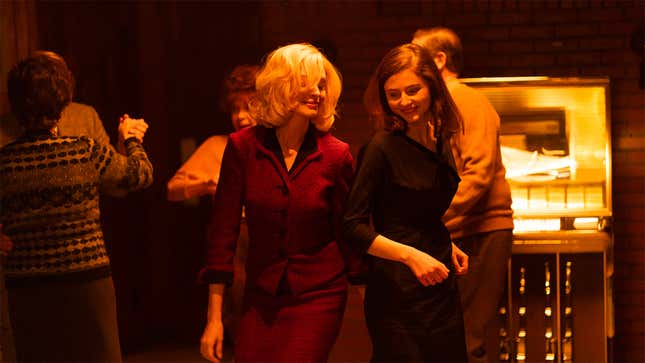‘Eileen’ Is a Beguiling—and Less Disgusting—Adaptation of Ottessa Moshfegh’s Novel
This kinder, gentler Eileen showcases a script by Moshfegh and an exquisite performance from Anne Hathaway.
EntertainmentMovies

Ottessa Moshfegh often writes the kind of books that seem unfilmable. Her stories are not typically impossible or too narratively thorny to make for a coherent viewing experience (though her most recent novel, the divisive Lapvona, is both of those things). It’s more like the depths of human filth she mines are too raw for mass consumption, or at least that which film must translate literally. Take, for example, her debut novel Eileen, about a 24-year-old juvenile detention facility clerk who describes herself as “a loser, a square, a dingaling.” She’s lonely and obsessed with bodily functions, like an inmate’s masturbation and her own diarrhea that her regular use of laxatives produces. (I’ll spare you the infamously in-depth description of her watery stool, but rest assured that it goes above and beyond to prove her assertion that she is not exactly a “pleasant person.”) She lives in a 1964 Massachusetts town with her verbally abusive father and stews in her life’s filth:
I didn’t really mind getting bossed around by my father. I’d get angry and I loathed him, yes, but my fury gave my life a kind of purpose and running his errands killed time. That is what I imagined life to be: one long sentence of waiting out the clock.
The hands of director William Oldroyd (Lady Macbeth) have sculpted a more user-friendly Eileen, played by Thomasin McKenzie. This Eileen, like the one in the pages of Moshfegh’s book, masturbates at work and smells her fingers, but she doesn’t go the extra mile of pressing her unwashed hand into a retiring colleague’s to bid him goodbye. There are standards here. Eileen, who Moshfegh described in an interview with Jezebel as a “disgusting female character,” is more odd than anything. We see her entranced with pubic hair on soap, chewing boxed chocolates and then spitting them out, replacing her father’s empty gin bottles dutifully. Without Moshfegh’s brilliant first-person narration, Eileen is a kind of walking question mark, and McKenzie strikes a deft balance between quirk and dissociation. This Eileen has been seemingly crafted to invite people in, while her literary counterpart practically dared people to look away.
-

-

-

-

-

-

-

-

-

-

-

-

-

-

-

-

-

-

-

-

-

-

-

-

-

-

-

-

-

-

-

-

-

-

-

-

-

-

-

-








































